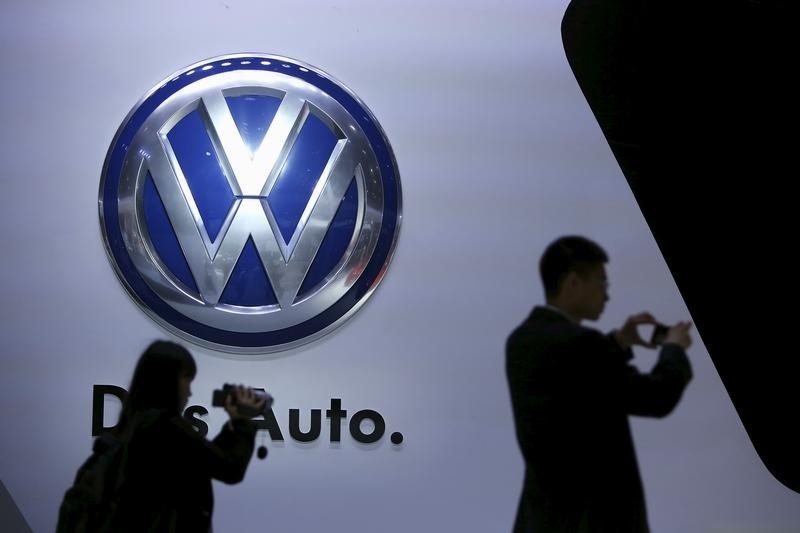By Edward Taylor
FRANKFURT (Reuters) - Shockwaves from a drop in Chinese car demand are reverberating in Wolfsburg, Germany and Detroit, Michigan, where VW (DE:VOWG_p) and General Motors (N:GM) are feeling the effects of a slowdown in a market that has been their big profit engine.
Both Volkswagen (XETRA:VOWG) and GM are heavily exposed to China, which remains a growth market, but last week cut its 2015 forecast for vehicle sales. The two car makers depend on the country for large parts of their profits and cash flow, and neither has a convincing story to tell about how to offset a slowdown in growth in the world's largest car market with other parts of their business.
Barclays (LONDON:BARC) downgraded GM's stock to "equal weight" from "overweight" on Thursday, saying it was likely to face the sharpest of the China headwinds among the U.S. autos and auto part makers it covers.
"It has a lot to lose in a Chinese decline ... There are few catalysts on the horizon," its analysts wrote in a note downgrading the entire U.S. sector to "negative" on China risks.
Volkswagen depends on China for more than half its net profit and 71 percent of its free cash flow including income from joint ventures and royalties, according to auto industry analysts.
GM made 40 percent of its net income from China equity income and 20-30 percent of its operating cash flow last year, according to Barclays.
China's passenger car market, the world's largest, is dominated by foreign players led by VW and followed by GM, Hyundai (KS:011760), Toyota (T:7203) and Nissan, but the share of domestic players such as Great Wall (SS:601633) is rising.
Volkswagen is vulnerable to a shift in demand towards more frugal cars as Beijing cracks down on displays of wealth and first-time car buyers in second-tier cities favour cheaper local models.
VW's profits have largely depended on its premium brand Audi (DE:NSUG), whose performance in China has worsened over the past seven months, while the VW brand lacks a fresh range of sports utility vehicles, China's fastest-growing vehicle segment.
On Thursday, Audi said it was reviewing its 2015 Chinese sales target in the latest sign that the downturn is more severe than expected.
IHS automotive analyst Henner Lehne said: "Audi's status as the brand of choice for Chinese bureaucrats used to be a boon but is now turning into a snare."
The luxury downturn has already hit German premium brands BMW and Audi. Audi, BMW (DE:BMWG) and Daimler's (DE:DAIGn) Mercedes-Benz command between 70 and 80 of China's premium market, where they earn 30-50 percent of their profits.
Now the malaise for foreign car makers is spreading to the mass market, where local players are gaining share.
Last week, the China Association of Automobile Manufacturers (CAAM) cut its 2015 vehicle sales growth forecast to 3 percent from 7 percent.
Volume brands like General Motors have already responded by cutting prices for vehicles and increasing discounts, squashing profit margins.
Barclays wrote in its note: "We think the pricing environment is likely to deteriorate sharply as dealers are forced to clear excess inventory and capacity growth outpaces sales growth."
But GM is not considering lay-offs or big production cuts, a Shanghai-based spokeswoman for automaker said in response to Reuters questions.
VW together with its local joint venture partners in the country have pledged to invest 22 billion euros through 2019 in new plants, models and equipment in China, reflecting the German group's commitment to future expansion.
STRUCTURAL ISSUES
The problems in China threaten to expose structural issues at both VW and GM that have been masked by the Chinese boom.
VW is already trying to realise 5 billion euros (4 billion pounds) in cost cuts it has promised at its core brand, with a high cost base in Germany. It is also failing to make significant inroads in the North American market.
The departure in April of long-serving chairman Ferdinand Piech was considered a catalyst for change but chief executive Martin Winterkorn has yet to present a new company structure.
Without the China effect and in the absence of any meaningful operational improvements, VW would have difficulty to pay a dividend, Credit Suisse (SIX:CSGN) analysts said.
"Our analysis shows that Volkswagen would struggle to cover its dividend without any contribution from China," its automotive analysts wrote on Wednesday.
Barclays said GM was now unlikely to meet its targets for the region, and it expected a decline of 1 percent in volume sales this year versus a company forecast of an increase of at least 6-8 percent.
The bank said it expected GM management to pull its mid-term target of a sustainable 9-10 percent profit margin in China, adding that it saw little room for GM to compensate in other regions such as North America or Europe.
"With little offset from the rest of the company, we see a cheap valuation and rich dividend as largely irrelevant," Barclays said.
Japanese car makers made smaller inroads in China and so are not as exposed to the effects of the slowdown.
"Even as Germans were having parties, we (Toyota and other Japanese companies) did some belt-tightening and other trench work," a senior executive for Toyota's China operations told Reuters.
"After dealing with a big sales slump in 2012 because of the soured bilateral relations between Tokyo and Beijing, we're used to slow growth."
